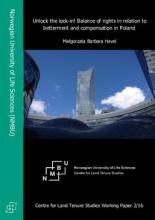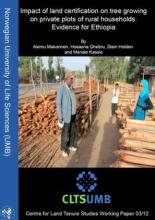Land Library Search
Through our robust search engine, you can search for any item of the over 73,000 highly curated resources in the Land Library.
If you would like to find an overview of what is possible, feel free to peruse the Search Guide.
/ library resources
Showing items 1 through 9 of 11.Many Polish cities are faced with a dilemma: to enact their local land-use plans and be exposed to the immediate financial consequences of their adoption, or to protect their budgets against these costs and give up control of the development of the cities.
To say that access to land is one of the most important conditions for the
empowerment of African women, would be an understatement. The cultivation of land is one
of the main sources of income and economic wealth depends strongly on a well-elaborated
This study finds that female-headed households have 23% smaller owned landholdings and 54% smaller operational landholdings.
As Parliamentary gender quotas have become increasingly popular, so too
has the debate surrounding their effectiveness in enhancing women’s
representation and gender equality in governments around the world. Women offer
This brief discusses a pilot intervention in Rwanda led by the Belgian
NGO, RCN Justice & Démocratie, with support from the International
Development Law Organization (IDLO) and the Belgian Government. A
more detailed and complete discussion of the pilot is given in Lankhorst
In Rwanda, for many years ago, rights over land for women and female orphans were not
recognized. The main causes were the inexistence of efficient land administration systems and
the prevalence of traditional system of land tenure which were complex and did not favor
This is the first of a series of consultations on the human rights challenges and dilemmas involved in the
acquisition and use of land – held individually or collectively - for private or state-owned business and
In Rwanda, two factors make land a highly important and contested issue. First,
Rwanda has the highest person-to-land ratio in Africa. This creates tremendous
pressure on land in a country where most of the population lives in rural areas, and








